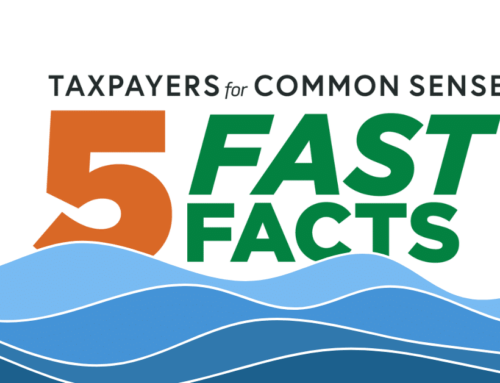Updated 9/28/2011
Reports of a meeting between House Republican leadership and Rep. John Mica (R-FL), Chair of the Transportation and Infrastructure Committee, have been swirling since it occurred late last week. Indications are that Rep. Mica is permitted to pursue additional funding to increase the likelihood of a multi-year transportation reauthorization bill passing in the relatively near future. Previously, the funding levels that Mica had to work with were constrained to the amount that the federal fuel taxes are expected to generate, which would have required a one-third reduction in spending as compared to current levels.
The new missive from leadership, however, does not allow Mica to increase Highway Trust Fund (HTF) revenues, as increases in the fuel taxes are strictly off the table. And new or increased taxes elsewhere are equally verboten. This new revenue, then, has to come from the increase in something taxable, and early bets are that the new House bill will propose an increase in offshore or other energy production. This increase would lead to higher royalties into the Treasury, and voila – a larger transportation bill.
Excuse us if this seems like another budget gimmick. For one, any royalties from any new energy development wouldn't start flowing to the Treasury for years. And that's assuming that the energy development itself takes place at all. Essentially this would be like spending money now to be paid for with revenues that may or may not be realized at some future time. Sounds like a recipe for a doubling down on our current deficit mess. Add to this the fact that some members are calling for sharing royalties with states, and suddenly the pie is getting sliced up with less available for transportation projects. We acknowledge that this is speculation, since we haven't seen any kind of proposal from the House, but if the word on the street is correct, than there is reason to be very skeptical about where this increased funding will be found.
In any case, since we know that a gas tax increase is off the table, anything that is proposed is very likely to erode the premise that underlies the HTF and therefore the entire transportation program: namely that capital and maintenance expenses related to the highway system be paid for by users of that system. Although imperfect, the current fuel taxes are a relatively good approximation of this principle. The more you drive, the more you pay. A far better approximation, of course, than funding the system through taxes on energy production, which has no relation whatever with how much you use the transportation system. This would erode the “user pays” principle in the same way that the transfers of general fund revenues to the HTF did a few years back when Congress had to shore up the trust fund's balance.
Jeff Davis of Transportation Weekly also brings up an interesting wrinkle that is a little in the weeds, but worth throwing out there nonetheless. An important element that makes the transportation program work is “contract authority.” In each long-term transportation bill, Congress grants states contract authority. This allows Alabama (and each of the states) to enter into a contract for, say, a highway construction project, even though it doesn't have the money in its possession yet from the federal government to pay on that contract. If Alabama was required to have the money in hand before the contracts could be signed, it would have to first acquire a big pile of cash to pay for the project, sign the contracts to begin the project, and then just leave that cash lying around doing essentially nothing, slowly paying it out as the contract is completed (presumably over a number of years). Contract authority was created so that states can sign long-term contracts, with assurances from Congress (usually in the form of long-term transportation bills) that the money will be there when it comes time to pay the contractors. Without this authority, it would be next to impossible for states to sign the kinds of contracts that are required to build a highway or transit system.
This is important in the current conversation because, as Davis points out, the HTF received a special grandfathering when all other contract authority was eliminated from federal budgeting in 1974. The transportation program kept the ability to spend on contract authority, but Congress put it place a requirement that at least 90 percent of what the HTF spends must be generated from taxes “related to the purposes for which such outlays are or will be made.” Generating additional revenues from an increase in energy production, therefore, would likely violate this requirement and at the very least result in an override of the Budget Act, but would also call into some question the importance of the “user pays” principle itself as it relates to paying for the transportation system.
TCS has long said that all options for increasing revenue should be on the table, and that any spending on transportation be constrained to HTF revenues. But any serious erosion of the “user pays” principle could result in a serious shift in how Congress and the public think about the nation's transportation program. It will certainly be interesting to see how the House Republicans juggle these issues in an attempt to pass a long-overdue transportation program extension.
—
Two bills have been introduced that offer us insight as to what proposals we might see from the House on this issue. In fact, each bill contains identical language regarding how the leases would work.
- Would assume (ie. passage of this bill would make it so) that: the draft proposed “Outer Continental Shelf Oil and Gas Leasing Program 2010-2015” is approved; that it is in compliance with the “Outer Continental Shelf Lands Act” (note that these are House bills which face enormous opposition in the Senate, so this is a major leap of faith); and that it is in compliance with the National Environmental Policy Act.
- Each requires the Secretary of the Interior to conduct a lease sale for Continental Shelf oil and gas drilling within 30 days, and then every 9 months thereafter; if there is no initial interest in a particular planning area, the Secretary would be required to gauge interest in that area every 2 years until there is interest in an offshore lease.
The differences between the bills is how each would slice up the royalties that additional offshore leasing might generate.
HR 1861 – “Infrastructure Jobs and Energy Independence Act”
Sponsor: Rep. Tim Murphy (R-PA)
Bill text: http://www.gpo.gov/fdsys/pkg/BILLS-112hr1861ih/pdf/BILLS-112hr1861ih.pdf
- Spreads the expected royalties more widely: 30 percent going to states whose lands are drilled; 10 percent to the Treasury's general fund; 2 percent to the Low-Income Energy Assistance Act through Health and Human Services.
- 20 percent into an “Infrastructure Renewal Reserve” for federal highway and safety projects; public transportation; water resources projects under the Army Corps of Engineers; and freight and passenger rail construction and repair projects.
- The funds in the bill are doled out into reserves (“Infrastructure Renewal Reserve”, “Clean Water Reserve”, etc.) from which spending would occur. In the case of highways, this would mean the money bypasses the Highway Trust Fund, which may help skirt the Budget Act issues discussed above. Further, the bill stipulates that the highway and highway safety funds be distributed using the same formulas that are used presently. Note that at present, distribution of a significant portion of funds from the Highway Trust Fund is based on the amount of gas tax paid in a particular state. These new funds, then, would be distributed based on formulas that have nothing to do with where the funds came from, and in fact create an entirely new class of “donor” and “donee” states.
- The remaining 38 percent would be committed to renewable energy projects (15 percent); clean water projects (3 percent); environmental restoration and conservation (7 percent); clean coal (8 percent); and nuclear (5 percent).
- According to the “Bipartisan Energy Working Group,” a House coalition led by Reps. Murphy, Tim Walz (D-MN); Bill Shuster (R-PA) and Jim Costa (D-CA), the bill would generate $2.2 trillion in royalties over 20 years; of that, $440 billion would be committed to the “Infrastructure Renewal Reserve.” This would equal an additional $22 billion per year.
HR 2893 – ''Rebuilding American Roads Act''
Sponsor: Rep. Shelley Capito (R-WV)
Bill text: http://www.gpo.gov/fdsys/pkg/BILLS-112hr2983ih/pdf/BILLS-112hr2983ih.pdf
- More directly targeted toward transportation: 4 percent would be committed to the Secretary of Interior for clean-up and inspection of leased tracts and $500 million annually to the Inland Waterways Trust Fund (which funds new construction and major rehabilitation projects on commercially navigable rivers and is suffering major funding shortfalls, an issue on which TCS recently testified), with the remaining funds deposited into the Highway Trust Fund.
- Stipulates that this money shall be used for “maintenance and construction of highways, bridges and tunnels.” Based on this language, it would appear that all of the funds would have to be used for roads, with none going toward rail or public transportation.
- From Rep. Capito's website: “According to independent estimates, this legislation is expected to yield $435.5 billion over thirty years.” This would equal an additional $13.4 billion per year into the Highway Trust Fund (after accounting for the set-asides listed above). It is unclear, however, why this figure is so much lower than that cited by Rep. Murphy, as the language regarding the execution of the leases is identical in both proposals.







Get Social